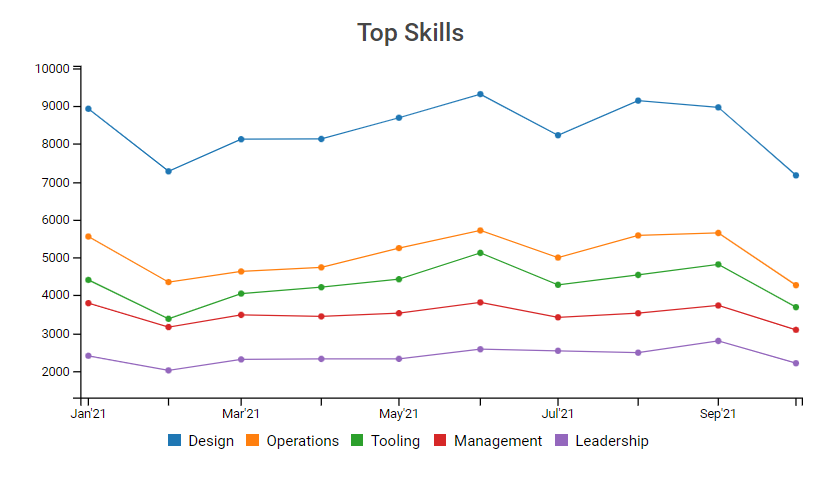Manufacturing Engineers work in every sector today, starting from food and beverages to plastics and construction. The job usually requires a high degree of skill along with domain-specific knowledge. Manufacturing Engineers are expected to plan, design, set up, monitor, and optimize processes in different industries.

Their main day-to-day job is to make sure that all industrial processes run flawlessly to reduce human or machine errors, or discrepancies in finished goods. They also need to keep finding innovative methods to improve the efficiency of workflows.
Manufacturing Engineer Salary
Here is a salary analysis of the Manufacturing Engineer Job profile from the Job Data collected by JobsPikr. From the salary range graph, it can be seen that the entry-level jobs in the Manufacturing Engineer profile come at around $80,000 and goes up to $150,000 for senior-level roles.

An interesting trend that was seen is that salaries dropped between 1-2 or 3 years of experience. A reason behind this can be the fact that most Manufacturing Engineer jobs that hire people with experience of 12 or fewer months may require advanced degrees instead. Due to this, the salaries are also higher. Whereas those being hired with 2-3 years of experience may not have advanced degrees and hence may be paid lesser.
However, post the 2-3 year mark, the salary trend is an increasing one, although it is not a linear trend. Post the 11-15 year mark, the salary rises most steeply, and this can be because the Manufacturing Engineer moves to a leadership position post this many years of experience.
Key Points in a Manufacturing Engineer Job Description
While you can browse multiple Job Posts on LinkedIn or Indeed or other job boards and websites, most job posts for Manufacturing Engineer positions have some things in common. You have to be well versed in one or more machine designing software like CAD and have some sense of product management and development. These usually have to be based around a core engineering degree. Along with these other essential criteria like attention to detail and teamwork are unspoken requirements in almost all the job posts. We shall elaborate on these in the following subheadings.
Manufacturing Engineer Profile Requirements
Education Requirements
An engineering degree is a must, to begin with. It can be in any of the following disciplines:
- Manufacturing or Production engineering
- Mechanical Engineering
- Electrical or Electronic Engineering
- Chemical Engineering
Although a master’s degree isn’t compulsory, a master’s in engineering can help you nail the job application faster. Sometimes trainees or apprentices also get promoted to the position after a few years of experience– this comes in handy when one does not have a relevant degree. Previous experience would also take you to the top of the application pool.
Skill Requirements
As a Manufacturing Engineer, one needs to have multiple skills in their resume to make sure that they can do justice to the job. The basics include:
- Knowledge of Engineering workflows and processes
- Problem-solving and logical thinking
- Communication and presentation skills
- Team Work– especially people management, since managing everyone on the factory floor can prove to be a challenge
- Project management skills
- Prior work experience in similar positions

Some other requirements that are commonly seen in most job posts are:
- Well-versed in relevant software like CAD
- Knowledge or working experience in manufacturing, fabrication, and design
- Familiarity with equipment and best practices of the industry
- Previous work experience with similar workflows
These experiences and skills would come in handy in carrying out various activities such as:
- Identifying faults, investigating problems, and repairing machines or fixing issues in the workflow.
- Improving the efficiency of workflows that are lagging.
- Supervising junior engineers and subcontractors to ensure all the cogs are running smoothly.
- Ensuring start-up and shut-dune schedules for all engineering workflows are maintained.
- Keeping a record of production figures along with metrics from different machines and parts of the workflow. This is required to ensure companies can stick to their budget figures.
- Working with the R&D department to help in new improvements wherever required.
Keeping a check on the latest tech in the manufacturing industry to implement any new upgrades that are available for a workflow.
Work Experience Requirements
Internships in the manufacturing industry or apprenticeships in well-known companies can improve your chances of landing a job offer after graduation by a vast margin. For this you might need to keep checking the career pages of multiple companies, their LinkedIn handles and also keep in touch with some who are already working at these companies. Referrals are the way to go in the 21st century.
Some courses offer an industry exposure experience for a few credit points. This will not only help you improve your GPA but will also boost your job-finding efforts by putting your experience to use. This type of hands-on training is what companies look for in candidates since they would have already mastered the basics, developed some skills, and gained an industry-level awareness.
Working Hours
Since a Manufacturing Engineer must always be present on the floor of a factory to ensure the smooth running of processes, most companies have multiple engineers working different shifts. This often means odd hours, or being called in for emergencies at any point in time. Extra hours may also be required when a company is testing or installing new processes. Manufacturing Engineers may also have to be available during the festive season to provide extra support during those crucial days when many companies need to run their processes over time to boost their production capabilities.
Top Global Employers
Any industry that uses factories with workflows to produce an end product employs Manufacturing Engineers to improve efficiency and prevent breakdowns. Opportunities exist in sectors like:
- Aerospace
- Automotive
- Medical Equipment
- Apparel
- Food and beverages
- Metal Works
- Chemical production
Employers range from small local operations to large multinational organizations with plants and operations all over the world.
There are many companies creating gigafactories today to generate products on a large scale. These factories not only need mechanics and scientists but also Manufacturing Engineers who can help build out different parts. Here are some of the top companies in different sectors around the world, that employ Manufacturing Engineers.
| Company | Industry |
| Texas Instruments | Health Care Products |
| Lockheed Martin | Aerospace & Defence |
| Procter & Gamble | Electrical and Electronic Manufacturing |
| Ford Motor Company | Transportation Equipment Manufacturing |
| Bell | Aerospace & Defence |
| General Electric | Industrial Manufacturing |
| General Motors | Transportation Equipment Manufacturing |
| Rolls Royce | Transportation Equipment Manufacturing |
| Niagara Bottling | Food & Beverage Manufacturing |
| Boeing | Aerospace & Defence |
Career Prospects
Career prospects may vary region and industry-wise, but as long as you keep upskilling yourself, going up the ladder should not be a very difficult task. Based on the size and organizational structure of the company that you join first, you may get an opportunity to move up in that very company or gather experience and move to a different company to reach higher positions.
The more years of on the factory floor and hands-on experience with different machines and workflows you have under your belt, the more companies will be after you to help them in improving their product manufacturing lifecycle. There is no shortcut here. It’s a gradual learning and improvement process. A healthy mix of in-house and on-site work experience is what will help you move up while continuously honing your skills.
As you gather more experience you could move up to a supervisory role where you may be in charge of multiple workflows or processes or a specialized role where your task may involve coming in to handle emergencies only. This role may be one of a project manager.
On the other end of the spectrum, you could also move to the R&D department to use your years of experience to cultivate innovations for the industry. With the growth of manufacturing in diverse industries today, with some effort you can easily reach top positions as a person with in-depth knowledge of the machines, processes, and best practices.




